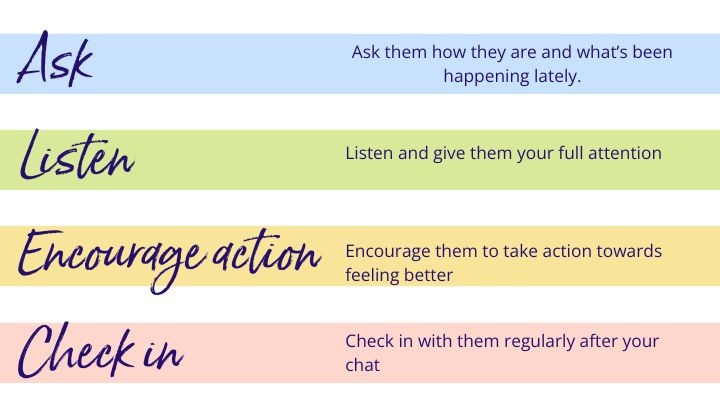Are you struggling to talk to your friend about mental health, or have you noticed someone might be struggling but you don’t know how to ask if they’re OK? Communicating about mental health can be challenging, especially for men.
However, with the help of ‘ALEC,’ we can normalise reaching out and discussing men’s mental health - not just for Men’s Mental Health Month - but all year round.
What is ‘ALEC’?
The term ‘ALEC’ stands for:
- Ask
- Listen
- Encourage action
- Check in
It’s a straightforward acronym that serves as a guide for those moments when you want to reach out to someone but are unsure of where to begin.
Why is ALEC and awareness around men’s mental health important?
Before we jump in, we understand that the topic of mental health can be a difficult one. It’s not always easy to open up, but it is important to try to be kind to ourselves and support others.
We know a lot of our learners enjoy using data and numbers to understand a topic. So, here are a few statistics to help us showcase just how important the topic of men’s mental health is to discuss:
- Three out of four (75%) of suicides in the UK are by men. This is, of course, alarmingly high.
- 52% of men would be concerned about taking time off work, whilst 46% would be embarrassed or ashamed to tell their employer.
- In 2016, a survey revealed that the majority of men said that they would take time off work for medical help for physical symptoms (such as unexpected lumps and chest pain), yet less than one in five said they would do the same for anxiety (19%) or feeling low (15%).
- Only 36% of referrals to NHS talking therapies are for men - suggesting they are less likely to ask for help.
- Suicide is the leading cause of death for men under the age of 50 in the UK.

How to use ALEC
ASK - simple questions can initiate a conversation about mental health and encourage someone to open up.
For example, start conversations with questions like, “you seem a bit off lately, is everything alright?” or “just checking in, how’s life treating you?” Make sure you appear engaged so they know you’re genuinely interested in their response.
LISTEN - actively listen by giving your full attention to the other person who is speaking.
Maintain eye contact and avoid interrupting as it can take a moment for someone to open up. These actions can help to create a safe space for someone who wants to open up, assuring them that they will be heard and respected.
ENCOURAGE ACTION - support and motivate the person to take positive steps towards improving their mental well-being.
The way you encourage action will usually depend on your relationship with the person, and how comfortable they are with opening up. For example, you may wish to make a small step towards improving their well-being by suggesting arranging further plans, such as going for a walk or a coffee. This can help them to get out of the house and socialise while also providing them with more opportunities to open up and explore the variety of options available that will help.
Alternatively, you could suggest steps like researching support groups or professionals to talk to. Offer to do the research with them so they can feel supported, but try not to overwhelm them with resources and solutions.
Encouraging actions may not always immediately be taken on board, but it can give the person some new perspectives on how to make small improvements.
CHECK IN - it’s so important to keep the conversation open and show that you care.
Checking in can be as simple as sending a text message to ask how they’re doing. This helps to build trust and encourage ongoing dialogue about their mental health.
So, next time you’re chatting to a friend, colleague, or anyone else - why not bring ALEC along?
Other ways to support men’s mental health
Movember Conversations provides several resources relating to ALEC and Men’s Mental Health Month to help you open up the dialogue. They even provide resources such as practice conversations to help you know how to approach specific situations.
At Kaplan, if you have concerns about your well-being or another learner’s, we have a dedicated well-being team that can help provide support and resources, and someone you can talk to in confidence.
If you have a safeguarding concern, you can find more information about our safeguarding team or reach out to safeguarding@kaplan.co.uk.